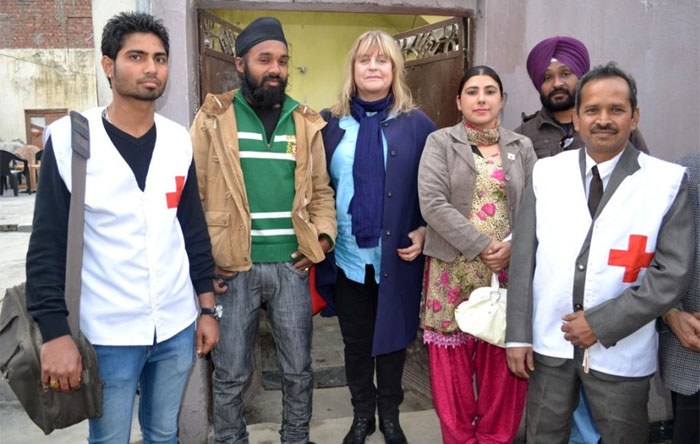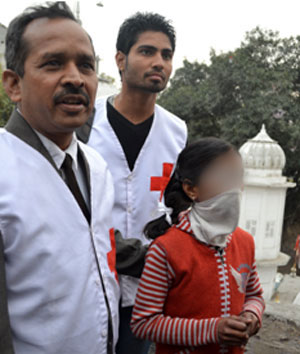
The stairs leading up to the apartment of the Singh family in the center of the town of Amritsar are steep and outworn. Breathless, one arrives at the first floor only to discover another winding flight to climb.
A challenge for anyone, healthy or sick. Yet, 14-year-old Sangeeta (name changed) does it with determination.
She climbs it although it makes her breathing heavier than before. She climbs it although she can longer hear the echo of her heels as she used to. She climbs it although her young body is over-run by a disease forcing her into a difficult treatment.
 |
| 14years old brave heart Sangeeta(name changed) with IRCS volunteers |
|
As she comes to greet me, her playful dark eyes sparkle behind the handkerchief covering her nose and mouth. Except for the beige piece of cloth, nothing speaks of the fact that she is suffering from multidrug-resistant TB (MDR TB), a strain which takes two years to cure and is 200 times more expensive that the one for category I patients. Along with painful injections, and the unwelcome side effect of losing part of her hearing, she is taking seven pills every day.
“It’s a lot of bitter pills to swallow, but I wish to get well,” she says, now halfway down the cure.
|
One of the reason to the successful adherence to her treatment stands next to her, the Red Cross volunteers Charanjit and Hardeep. Since Sangeeta was diagnosed with MDR, they have made constant house calls, provided advice, supported her with transport to the hospital and adding on supplementary protein to her diet, as weight loss is frequent among TB patients.
“To submit the toxic side effects of the MDR treatment is a challenge to anyone. It takes another human being to motivate and support. The human touch in the TB intervention is the key to success,” says Dr. Kailash Raizada, Senior Advisor to the International Federation of Red Cross and Red Crescent Societies (IFRC).
With around nearly two million new cases in India per year, the task to combat TB in India is monumental. According to India’s Revised National TB Control Programme, about 800,000 cases are infectious and causing 1,000 deaths every day.
Since 2009, the IFRC is assisting the India Red Cross Society in an intervention, which includes 1,180 patients among the most vulnerable people living with TB, in particular category II patients. The term category II implies someone who has failed previous TB treatment, relapsed after treatment, or defaulted during previous treatment.
The scope of the intervention, which covers seven states, is especially aimed at these patients, as they run the risk of developing MDR TB. Nonetheless, it takes persistence and perseverance to ensure the 100 percent adherence to treatment. Navdeep Kaur, District Coordinator of the TB Programme in Jalandhar, knows. One of her patients was Gurprett Singh. One day, he simply disappeared.
“His parents were quiet about his whereabouts. We returned for several days, but not a sight of him. Asking around in the community, we finally found him in jail,” Navdeep Kaur recalls.
Alerting the prison authorities about his medical condition, Gurprett Singh was diagnosed and put under treatment again. With further support from the Red Cross, assisting with nutrition in jail, he then followed through with the treatment and is now cured.
The commitment of the Red Cross volunteers also inspires others. In the outskirts of Jalandhar, a wooden barrack in a long line of shops and offices is home to a DOTS center, where healthcare workers observe TB patients under treatment. The dust is swirling in the air as heavy trucks are passing by, and Red Cross volunteer Sunita Devi is carefully closing the door behind the patients.
Recently 61-year-old Omparkash, a TB patient himself, has now joined her and being a community leader in this industrial neighborhood with a huge migrant population, he is considered as a role model among TB patients.
“People live in very cramped condition with inadequate ventilation. If one person is ill, the other will be infected. I take every chance I get to raise awareness and reduce stigma”, says Omparkash.
Indian Red Cross is now looking into ways of expanding the TB programme for category II patients.
“Extending our humanitarian services to reach more category II patients will be a contribution to making India a TB free country. Every patient we cure means less human suffering and less money spend on treatment. Also, an infected person risks to spread the infection to fifteen people, which we hinder through our intervention”, says Dr. SP Agarwal, Secretary General of Indian Red Cross Society.